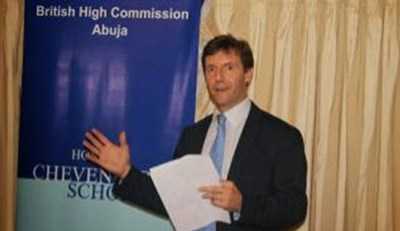 British Deputy High Commissioner to Nigeria, Simon Shercliff
British Deputy High Commissioner to Nigeria, Simon Shercliff
As WAANSA urges countries to ratify ATT
Senator Iroegbu and Adedayo Akinwale in Abuja
The British Government Friday said her arms were not part of the ones in the country that had contributed to the blood-letting of more than 14,000 innocent Nigerians since the Boko Haram terrorists launched their insurgency in the North-east six years ago.
The British Deputy High Commissioner to Nigeria, Simon Shercliff, disclosed this on Friday at a press conference in Abuja organized by the West Africa Action Network on Small Arms (WAANSA) on Arms Trade Treaty (ATT).
According to Chercliff, “there is a huge amount of small arms that have been trafficked into Nigeria that are being used by the insurgents to perpetrate that evil act in the North-east, which have caused damage, killing innocent people, women, children, and civilians”.
“We want to stand with you as a partner, as a long standing friend to combat this trend”, he said
The Envoy noted that the government of United Kingdom (UK) has a very strict control over the export of weapons to other countries, stressing that many conditions would have been considered before transaction would be carried out, “like the human rights record of the country, the reason for the importation of arm and so on, just to affirm the arms are not getting into wrong hands”.
“I can guarantee you that there are no British arms inside Nigeria that is contributing into the blood shedding in the North east”.
Responding to a question, Shircliff noted that the American government was not among one of the first countries to ratify the ATT, due to the impact it would have on her economy considering the number of companies producing arms there, stressing that China and Russian equally expressed the same sentiment.
He said he has discovered that there are too main challenges facing Nigeria on the issue of the treaty.
He said: “One, is the arms trade treaty that your government have signed, which now needs to be domesticated. At the moment it is an international treaty. We are working closely with you to encourage the Nigerian authority to transform ATT into domestic Nigerian law. That is a very important next step, and that’s what we hope would happen as soon as possible.
“The second challenge is the implementation of the treaty. The implementation of the treaty requires government, security agencies, civil society, the media, business, every part of the Nigerian society need to understand what they need to do to implement this treaty to follow the law, and to ultimately make sure the traffic of arms and small arms in particular reduces to nothing in Nigeria,” he said.
On his part, the Regional President, WAANSA, Mr. Baffour Amoa said the association played a significant role in Negotiating the treaty with 193 member states, adding that 130 countries had already signed the treaty, while 63 states have already ratified it.
Amoa explained that the ATT was a document that began to recall the effort of UN and other international organisation have made to regulate the way arms were traded.
He noted that it was not enough for the member countries to ratify the treaty but also for them to implement as it would improve peace and security around the world as well as reduce conflicts.
The treaty which is subjected to a review every five years has been ratified by 37 countries in Africa and seven countries in West Africa.



























